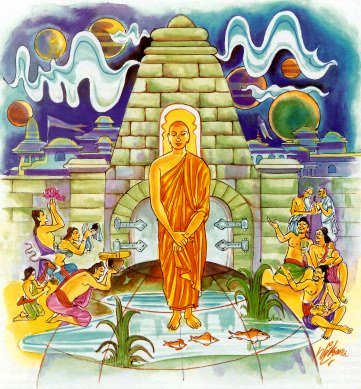Like earth is one who’s well-behaved,
secure and not resentful,
as city-post, as filth-free lake,
no wanderings-on for One Who’s Thus.
Explanation: The noble Arahats never lose their temper whatsoever is done to them. They are firm and unshaken as the gate-pillars that secure the city gates. They are as lucid and tranquil as the ocean and the lakes devoid of mud. That kind of person ceases to wander in the round of existence – samsara.
The Story of Venerable Sariputta (Verse 95)
While residing at the Jetavana Monastery, the Buddha spoke this verse, with reference to the Chief Disciple Sariputta and a young monk.
Once upon a time, at the conclusion of the rains, Venerable Sariputta, desiring to go forth on an alms-pilgrimage, took leave of the Buddha, paid obeisance to him, and departed with his own retinue. Many other monks took leave of the Venerable. In dismissing the monks the Venerable mentioned the personal and family name of all of the monks who were known by personal and family names. A certain monk who was not known by a personal and family name said, “Oh, that the Venerable would greet me by a personal and family name in dismissing me.” But in the great throng of monks the elder did not notice him. Thereupon the monk said to himself, “He does not greet me as he does the other monks,” and straightaway conceived a grudge against the Venerable.
Besides that, the hem of the Venerable’s garment brushed against the monk, and this also served to intensify the hatred the monk felt towards the Venerable. So, as soon as he knew that the Venerable had passed beyond the entrance to the monastery, he approached the Buddha and said to him, “Venerable, Venerable Sariputta, doubtless thinking to himself, ‘I am your chief disciple’, struck me a blow that almost injured my ear. Having so done, without so much as begging my pardon, he set out on his alms-pilgrimage” The Buddha caused the Venerable to be summoned.
Venerable Sariputta came with the rest, saluted the Buddha, and sat down respectfully on one side. When the Buddha questioned him about the incident, the elder, instead of saying, “I did not strike that monk,” recited his own virtues.
As the Venerable recited his own virtues, remorse pervaded the whole body of the monk who had unjustly slandered him. And straightaway he fell at the feet of the Buddha, admitted that he was guilty of slander, and confessed his fault. The Buddha addressing the Venerable, said, “Sariputta, pardon this deluded man, lest his head split into seven pieces.” Thereupon the Venerable crouched before the monk, and extending his clasped hands in an attitude of reverence, said to him, “Venerable, I freely pardon this venerable monk. Let this venerable monk also pardon me if I have in any way offended against him.” Thereupon the monks said, “Behold, brethren, the surpassing goodness of the Venerable! He cherishes neither anger nor hatred against this lying, slanderous monk. Instead, he crouches before him, extends his hands in an attitude of reverence, and asks his pardon.” When the Buddha heard the talk of the monks, he said, “Monks, what are you talking about?” When they told him, he said, “Monks, it is impossible for Sariputta and his like to cherish anger or hatred. Sariputta’s mind is like the great earth, like a threshold, like a pool of still water.”

